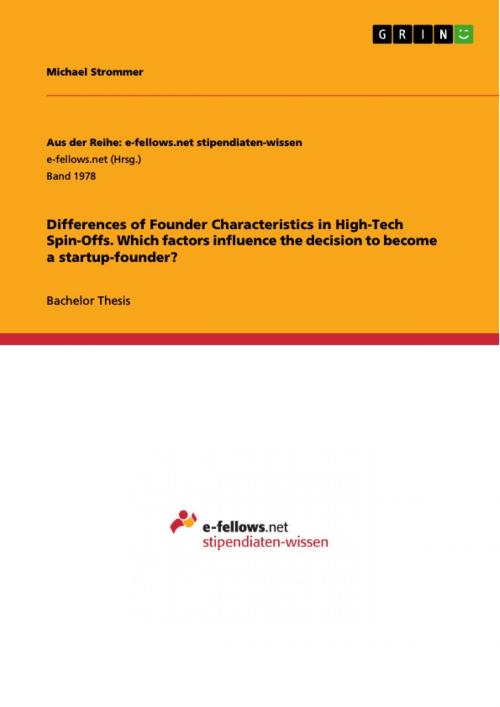Differences of Founder Characteristics in High-Tech Spin-Offs. Which factors influence the decision to become a startup-founder?
Business & Finance, Finance & Investing, Finance| Author: | Michael Strommer | ISBN: | 9783668255630 |
| Publisher: | GRIN Publishing | Publication: | July 7, 2016 |
| Imprint: | GRIN Publishing | Language: | English |
| Author: | Michael Strommer |
| ISBN: | 9783668255630 |
| Publisher: | GRIN Publishing |
| Publication: | July 7, 2016 |
| Imprint: | GRIN Publishing |
| Language: | English |
Bachelor Thesis from the year 2016 in the subject Business economics - Investment and Finance, grade: 1,3, Technical University of Munich (TUM School of Management), language: English, abstract: Entrepreneurship is a booming topic. More and more entrepreneurs set out to launch their own startups to eventually turn them into unicorns one day. But what makes people choose a risky, unsafe alternative over a safe, waged employment? I digged into personal motives, social and cultural aspects to fully understand the drivers of entrepreneurship. To get empirical evidence, a study among startup founders from TU Munich was conducted. Chapter 1 will therefore describe the nature of HTSOs, differentiate their nature from non-technology start-ups and further highlight their importance in securing economic progress. After getting an understanding of the topic's importance to the business community and why exactly such specific foundations are subject of this thesis, the focus in Chapter 2 shifts from an institutional to a personal level. Chapter 2 will investigate different theories which explain how an individual's characteristics and personality are shaped throughout the course of life. This is important to get an understanding of the core subject of this thesis, the individuals who have come-up with promising innovations and founded their own spin-off. Research on start-ups and their founders is relatively new compared to traditional fields of studies, but has already contributed remarkable insights into founder characteristics, personality traits of founders and success factors of start-ups in general. Chapter 3 is dedicated to the empirical section of this thesis, describing the methodology of the survey and conducting a descriptive analysis of the survey findings. In a second step, the results are discussed and elaborated on in more detail.
Bachelor Thesis from the year 2016 in the subject Business economics - Investment and Finance, grade: 1,3, Technical University of Munich (TUM School of Management), language: English, abstract: Entrepreneurship is a booming topic. More and more entrepreneurs set out to launch their own startups to eventually turn them into unicorns one day. But what makes people choose a risky, unsafe alternative over a safe, waged employment? I digged into personal motives, social and cultural aspects to fully understand the drivers of entrepreneurship. To get empirical evidence, a study among startup founders from TU Munich was conducted. Chapter 1 will therefore describe the nature of HTSOs, differentiate their nature from non-technology start-ups and further highlight their importance in securing economic progress. After getting an understanding of the topic's importance to the business community and why exactly such specific foundations are subject of this thesis, the focus in Chapter 2 shifts from an institutional to a personal level. Chapter 2 will investigate different theories which explain how an individual's characteristics and personality are shaped throughout the course of life. This is important to get an understanding of the core subject of this thesis, the individuals who have come-up with promising innovations and founded their own spin-off. Research on start-ups and their founders is relatively new compared to traditional fields of studies, but has already contributed remarkable insights into founder characteristics, personality traits of founders and success factors of start-ups in general. Chapter 3 is dedicated to the empirical section of this thesis, describing the methodology of the survey and conducting a descriptive analysis of the survey findings. In a second step, the results are discussed and elaborated on in more detail.















